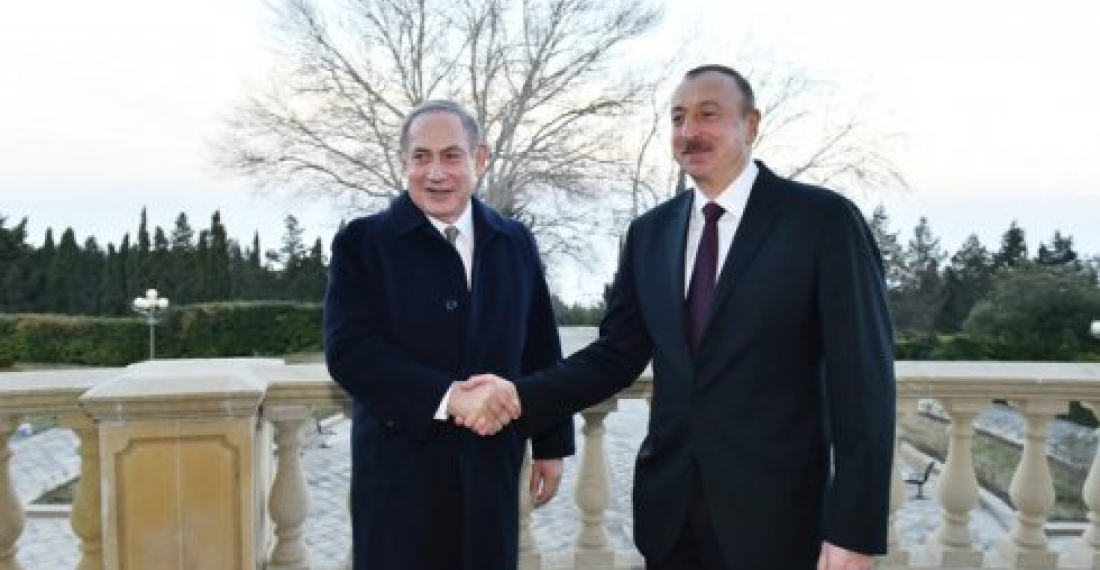Israel has sold US$ 5 billion worth of military equipment to Azerbaijan in recent years, making it the country's second biggest arms supplier after Russia. This was confirmed by Azerbaijani president Ilham Aliev whilst talkling to journalists during the visit to Baku of Israeli prime minister, Benyamin Netanyahu.
President Aliev told journalists,
"So far the contracts between Azerbaijani and Israeli companies with respect to purchasing defense equipment has been close to five billion dollars. More precisely, 4,850,000,000 dollars. The biggest part of these contracts has already been executed and still we continue to work on that. And we are very satisfied with the level of this cooperation."
Co-operation between the two countries is strong in many other fields, including energy. Israel buys a quarter of its oil supplies from Azerbaijan, according to the Jerusalem Post.
Netanyahu's visit has been criticised in Iran. The Iranian news agency MEHR reported that a march in the Iranian city of Tabriz was held on Friday denouncing Netanyahu’s trip to Azerbaijan, and demanding that Baku cancel it.
Iran’s Tasnim News Agency quoted Iran’s former ambassador, Mohsen Pakayeen, as saying the visit “contravenes Azerbaijan’s commitments to the Islamic community.”
According to the agency, “Pakayeen said the Republic of Azerbaijan, as a member of the Islamic community, should remain committed to Muslim nations’ agreements on the prohibition of any ties with Israel or any measure that would break the isolation of the Zionist regime.”
Iran’s Fars News Agency quoted Hossein Amir Abdollhaian, senior adviser to Iran’s speaker of the parliament, as saying that Netanyahu was trying to “hatch new plots” by his visit. “The upcoming visit of Netanyahu to Baku should be regarded as a new conspiracy for the region,” he said.
President Aliev however took the opportunity during Netanyahu's visit to emphasise Azerbaijan's historical relations with Jewish communities and its tolerance of all faiths. The president said,
"For centuries, Jews and Azerbaijanis have lived in peace, friendship and continue to live here in Azerbaijan. And the Jewish community in Azerbaijan is a very active part of our society, they contribute a lot to the development of modern Azerbaijan and these close relations between our people is a very important factor in our bilateral relations. For your information, I'd like to say that there are seven synagogues, five of them in Baku....".
"Relations between Jews and Azerbaijanis have always been very good, during all the times of our history. Jews have lived in Azerbaijan for centuries. It's their home, they feel themselves at home, and they do a lot in order to strengthen our country. This was during the times of the Tsarist Russia when Azerbaijan was part of Russian Empire, this was during Soviet Union times and now for 25 years of independence relations between the people, all the people who live in Azerbaijan is a good example of multiculturalism, mutual respect, and respect for each others' traditions, religion. I always say that respect for your own religion and tradition starts with respect for traditions and religions of your neighbour."
From Baku, Netanyahu travels to Kazakhstan.
source: commonspace.eu with Jerusalem Post and agencies
photo: President Aliev of Azerbaijan and prime Minister netanyahu of Israel pose for pictures in a snowy Baku on 13 December 2016 (picture courtesy of the press service of the President of Azerbaijan).







